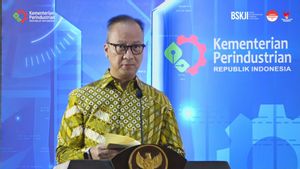JAKARTA - Researcher from the Center of Industry, Trade, and Investment Institute of Development for Economics and Finance (Indef) Dzulfian Syafrian said that Indonesia's debt in the current era of President Joko Widodo (Jokowi) leadership will have an impact on future generations, especially the millennial generation.
At the end of 2020, Indonesia had debts of IDR 6,074.56 trillion or an increase of 27.1 percent of IDR 1,269 trillion compared to 2019. However, this number will increase in 2021.
The Ministry of Finance noted that Indonesia's debt position at the end of February 2021 reached IDR6,361 trillion. This figure is an increase of IDR 128 trillion from the January 2021 period of IDR 6,233 trillion.
Dzulfian said that the Jokowi administration's debt is a long-term debt. Thus, both public and private debt has great potential to affect the lives of the next generation.
Furthermore, he said, the accumulation of debt will become a burden for the current productive generation to pay for it, and has the potential to cause conflicts between generations, namely generation Y (millennial), generation Z, and older (baby boomers) or what he called 'colonial'.
"They create debts but are burdened to the next generation. (So) the burden is on the next generation," he said in a virtual discussion, Wednesday, March 24.
Dzulfian said the composition of policy makers is currently dominated by the colonial generation, including economic policies related to debt. Meanwhile, the representation of the younger generation in the executive, legislative and judiciary is minimal.
"So it is only natural that their aspirations are not represented," he said.
Referring to the CEIC data he processed, Dzulfian said that public and private debt both increased in the era of Jokowi's leadership. In fact, the private sector prefers to borrow with long-term tenors, while short-term debt is relatively stable.
Furthermore, he said, there are differences in terms of the choice of currency denomination between private and public debt. The private sector tends to choose debt in foreign currency, while the public tends to choose domestic.
"Domestic debt is more accepted by the public politically, if foreign is somewhat reluctant. In fact, domestic debt has more expensive interest, in the end populist policies, however detrimental to the state," he explained.
The English, Chinese, Japanese, Arabic, and French versions are automatically generated by the AI. So there may still be inaccuracies in translating, please always see Indonesian as our main language. (system supported by DigitalSiber.id)













